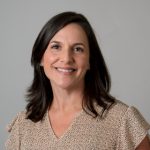
Mary Tabb Foley first joined the UConn community more than 20 years ago as an undergraduate student. UConn was her first choice – a place that felt both exciting and familiar, being close to her hometown in Connecticut. She began her time at UConn planning to become an elementary school teacher, until a chance enrollment in a Human Development and Family Relations course which required a fieldwork placement changed her entire academic plan. Assigned to the infant classroom at the Child Development Labs, Mary felt an immediate and undeniable pull toward early childhood education, working with children under three years old. That single experience redirected her path and opened the door to a career she instantly knew aligned with her heart and life’s purpose.
Mary often shares this story with students as an example of how remaining open to new experiences or opportunities can lead to a deeply fulfilling and unexpected journey – both professionally and personally. After graduating from UConn, Mary worked in community-based early childhood programs in several urban areas of Connecticut, caring for and guiding the learning of infants, toddlers, and preschoolers. Finding ways to discover her professional role and engaging in statewide organizations and events, she strengthened her commitment to leadership and her desire to positively impact the lives of young children and families.
Driven by her passion for lifelong learning, Mary pursued a Master of Arts dual-degree in Early Childhood Education/Early Childhood Special Education from the University of Saint Joseph, along with CT Teacher Certification focused on birth through kindergarten. She subsequently worked with Connecticut’s youngest children in the CT Birth to Three system and later spent nearly five years with the Early Childhood Consultation Partnership. This statewide mental health consultation program allowed Mary to integrate her deep knowledge of child development, family engagement, and caregiver support to enhance the social and emotional well-being of children birth to five. Her professional roles have spanned the many facets of early childhood work—high-quality education, developmental guidance, early intervention, and community collaboration.
In 2012, Mary returned to UConn in a new capacity, joining UConn Stamford as a lecturer and program coordinator for the new Early Childhood Specializations (ECS) on that campus. Historically offered only in Storrs, Mary launched the specialization in Stamford to expand access and respond to the need for highly prepared early childhood professionals in Fairfield County. After a decade of supporting, shaping, and growing the Stamford program, Mary transitioned back to Storrs in Fall 2022, where she continues to serve as faculty in HDFS.
Since rejoining the Storrs campus, Mary has devoted much of her work to strengthening the ECS program and reaching as many students as possible who might want careers working with young children and families. Through these efforts she has brought recognition to the program and to the department’s broader initiatives. She plays a key role in coordinating program activities, advising and mentoring students, and supporting the structures that help ECS thrive. Mary has also contributed deeply to the ECS national accreditation efforts, helping to align curricula, gather data, and document program quality. She approaches this work as part of her commitment to supporting colleagues, improving student experiences, and ensuring that future early childhood professionals receive the intentional, high-quality preparation they deserve.
With a consistent passion for continued growth and learning, Mary regularly seeks opportunities at UConn and on a broader national level to strengthen her teaching, deepen her understanding of early childhood policy and advocacy, and remain responsive to the evolving needs of the field. She believes that early childhood professionals must be open to continuous learning to best support young children and families, a belief that fuels her dedication to preparing emerging early childhood professionals year after year.
Mary lives with her husband, two young sons, and their dog, Nico, just over the state line in Longmeadow, MA. Outside of her professional life, she enjoys time with family, creating a comfortable home, and diving into her many interests, including reading, running, DIY projects, cooking and baking, organizing, and dreaming up future travel adventures to see as many parts of the country/world as possible.
 Congratulations to *Elise Sumsion, who received the Best Student/Early Career Presentation Award for her paper The Bisexual Identity Enactment Model: A Model Grounded in Identity Theory at the Theory Construction and Research Methodology Workshop in Baltimore, Maryland.
Congratulations to *Elise Sumsion, who received the Best Student/Early Career Presentation Award for her paper The Bisexual Identity Enactment Model: A Model Grounded in Identity Theory at the Theory Construction and Research Methodology Workshop in Baltimore, Maryland.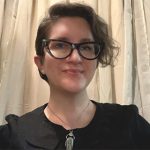 Congratulations to Alaina Brenick, winner of the UConn MLK Legacy Award!
Congratulations to Alaina Brenick, winner of the UConn MLK Legacy Award!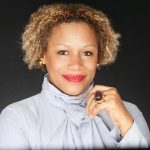 Vida was promoted to Associate Professor-in-Residence effective August, 2025!
Vida was promoted to Associate Professor-in-Residence effective August, 2025! Gloria Oladeji is a first-year HDFS PhD student in the Health, Wellbeing, and Prevention specialization. She earned her bachelor’s degree in Health Education with a minor in Human Kinetics from the University of Ibadan (Nigeria) in 2021, and completed her master’s degree in Kinesiology and Health at the University of Wyoming in 2025. At the University of Wyoming, Gloria examined how Nigeria’s food security interventions align with the United Nations’ best practices for achieving Sustainable Development Goal 2—a focus on ending hunger, achieving food security and improved nutrition, and promoting sustainable agriculture. She also contributed to mental health research, deepening her interest in the intersection between food security, mental health, and the social determinants of health. Beyond academics, Gloria is passionate about social impact and gender equity. She is the founder of The GLEA Network (The Gloriae Girls’ Empowerment and Advancement Network), a youth-led nonprofit advancing education, health, and empowerment for girls and women in underserved communities. One of her major projects before coming to the U.S. focused on supporting the mental health of young girls who were survivors of female genital mutilation by providing psychosocial care and community sensitization.
Gloria Oladeji is a first-year HDFS PhD student in the Health, Wellbeing, and Prevention specialization. She earned her bachelor’s degree in Health Education with a minor in Human Kinetics from the University of Ibadan (Nigeria) in 2021, and completed her master’s degree in Kinesiology and Health at the University of Wyoming in 2025. At the University of Wyoming, Gloria examined how Nigeria’s food security interventions align with the United Nations’ best practices for achieving Sustainable Development Goal 2—a focus on ending hunger, achieving food security and improved nutrition, and promoting sustainable agriculture. She also contributed to mental health research, deepening her interest in the intersection between food security, mental health, and the social determinants of health. Beyond academics, Gloria is passionate about social impact and gender equity. She is the founder of The GLEA Network (The Gloriae Girls’ Empowerment and Advancement Network), a youth-led nonprofit advancing education, health, and empowerment for girls and women in underserved communities. One of her major projects before coming to the U.S. focused on supporting the mental health of young girls who were survivors of female genital mutilation by providing psychosocial care and community sensitization.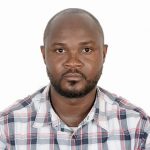 Sampson Chinonso Ipiankama is a first-year HDFS PhD student specializing in adulthood, aging, and health. Before joining UConn, he served as the Research, Grants, and Sustainability Lead at Project PINK BLUE – Health & Psychological Trust Centre in Nigeria, leading national initiatives supported by organizations such as AstraZeneca, the Global Colon Cancer Association, the International Gynecologic Cancer Society (IGCS), the ACT Foundation, and From Testing to Targeted Treatments (FT3) to strengthen cancer control and patient-centered care across Nigeria.
Sampson Chinonso Ipiankama is a first-year HDFS PhD student specializing in adulthood, aging, and health. Before joining UConn, he served as the Research, Grants, and Sustainability Lead at Project PINK BLUE – Health & Psychological Trust Centre in Nigeria, leading national initiatives supported by organizations such as AstraZeneca, the Global Colon Cancer Association, the International Gynecologic Cancer Society (IGCS), the ACT Foundation, and From Testing to Targeted Treatments (FT3) to strengthen cancer control and patient-centered care across Nigeria.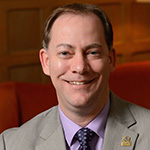 A CT Insider investigation into homelessness in Connecticut quoted Preston Britner on the need to support child welfare-involved families. Read the article here
A CT Insider investigation into homelessness in Connecticut quoted Preston Britner on the need to support child welfare-involved families. Read the article here